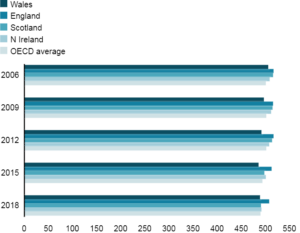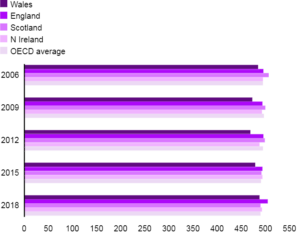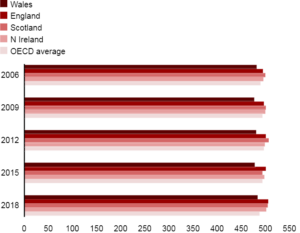The latest international test results for teenagers – Pisa – have been published.
There is a keen eye on how students in Wales have performed, but why? Here is our guide.
What are Pisa tests?
Pisa’s full title is Programme for International Student Assessment – the main tests are in maths, reading and science and are run every three years by the Organisation for Economic Co-operation and Development (OECD)
Tests take about two hours and all are done on computer.
In 2018, they were taken by 600,000 15-year-old pupils in 79 countries and regions.
In the last results, Singapore outperformed all other participating countries. Japan, Estonia, Hong Kong and Canada were also among the top performers. This time around, four Chinese provinces finished top in all areas.
How has Wales performed?
This was the fifth time Wales has taken part – results in 2010 saw Wales slip below average performance in all three subject areas and was described by the then-education minister as «unacceptable» and «alarming». But the 2018 tests have brought improvements, if Wales is still trailing England in particular, of the other UK nations.
Wales has moved closer to the international average. Education Minister Kirsty Williams said: «We have caught up, we are continuing to improve in all areas and as a nation we must be determined to keep up this momentum.» In reading, latest tests showed a significant increase in the scores of higher achieving pupils in Wales since 2015 but the scores of lower achieving pupils have not changed significantly.
Pisa test result averages in science
Scores of 15-year-old pupils, UK nations
 Source: OECD, December 2019
Source: OECD, December 2019Wales has moved closer to the international average. Education Minister Kirsty Williams said: «We have caught up, we are continuing to improve in all areas and as a nation we must be determined to keep up this momentum.» In reading, latest tests showed a significant increase in the scores of higher achieving pupils in Wales since 2015 but the scores of lower achieving pupils have not changed significantly.
Pisa test result averages in mathematics
Scores of 15-year-old pupils, UK nations

In science, back in 2015, there were 28 countries with mean scores higher than Wales; that figure is now 19 countries. The study also said Wales had made «encouraging progress» in mathematics, and was close to the OECD average for the first time.
Why had we been doing so badly?
There is no single reason, but one factor identified by the OECD was the need improve the quality of teaching.
Former education minister Leighton Andrews said the Welsh Government may have taken its «eye off the ball» in the 2000s when it scrapped testing and league tables.
The report into the 2015 tests found only 6% of the variation in student performance in Wales could be put down to their socio-economic background. The results also showed Wales’ highest performers were achieving lower scores than the OECD average and top performers in other parts of the UK.
Andreas Schleicher, head of education and skills at the OECD, said the nation had under-performed and the education system had «lost its soul» by not focusing on high-quality teaching.
He said reforms in Wales were on the right lines but it will take a while for these to have an impact.
Why are they important?
They have become an increasingly influential indicator of global education performance since they were introduced in 2000. Some argue that major businesses look at Pisa scores before making investment decisions, but there are plenty of sceptics who say too much emphasis has been placed on Pisa by politicians.
There are also questions about how useful it is to compare 15-year-olds in such varied education systems and cultures across the world.
In Wales, ministers have made improving Pisa scores a top priority over the past decade and said they tested the skills young people will need in future.
- 500-score Pisa target dropped in Wales
- Wales still worst in UK in world education tests
- What can Wales learn from Poland?

What has happened since the last tests?
Education is going through a period of major reforms, many of which have been influenced by Pisa. Some were introduced after the 2010 results, including a renewed focus on literacy and numeracy. There have also been changes to teacher training.
Reformed GCSEs are also more aligned with the skills Pisa tests assess. The last results highlighted concerns more able and talented pupils were not being stretched so the Welsh Government has invested £3m to boost their performance.
The biggest reform of all is the ongoing development of a new curriculum which will be introduced in classrooms from 2022. The OECD welcomed the changes, but said improvements in results would take time.

What are the thoughts from the top performers?
In Singapore, which had the best performance last time, education expert Dr Pak Tee Ng said it was about resources and investment.
«It’s not just about investing money, it is investing in teachers, investing in professional development, investing so that the schools will be places, safe places and places for children to learn and to grow,» he said.
«Not only that, I think we play a lot of attention to making sure that we have a much more positive narrative of education. That is to say we would like people to know that good things are happening in the schools and to us teachers are nation builders.
«The right spirit for education should be that for the sake of our children, for the sake of our country, we will improve regardless of where we stand in international comparative tests.»
When asked about creating a more positive narrative in Wales, Dr Pak said: «Let’s not make any international comparative tests into some kind of world cup – children’s education is not about competition like a world cup of some sorts.
«I would say it is right and proper for any country to improve the education system with or without international comparative tests.»
Should we still take part?
Prof Alma Harris, head of Swansea University’s school of education, said: «Pisa does exactly what it says on the tin.
«It looks at the performance of 15-year olds in three different subjects every three years but an education system is way more dynamic than that and therefore looking at issues of mental health in young people, well-being, inclusion, equity – these are all things that Pisa can’t measure but they’re very important to any education system – it’s what gives it excellence and equity.
«So I’d say that Pisa is one dimension, one indicator that we should take account of – of course – policy-makers will take account of it whatever we say – but to recognise that it is really one very small indicator amongst many others that would give a more contextualised picture of how a system is performing.
«Pisa of itself is not problematic, it’s what people do with Pisa and how they interpret Pisa and I think where it’s been most unhelpful is where it’s changed the policy discourse in a country, away from the way the country may have been going.»
Prof Harris said Pisa was problematic if it distracted a country from reform and Wales was «on a very clear reform trajectory.»
Fuente de la Información: https://www.bbc.com/news/uk-wales-50587348









 Users Today : 180
Users Today : 180 Total Users : 35402729
Total Users : 35402729 Views Today : 241
Views Today : 241 Total views : 3331861
Total views : 3331861